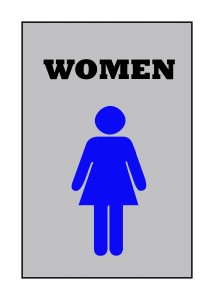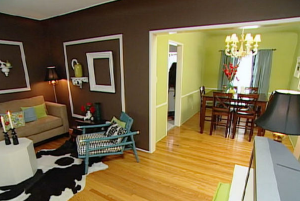Posted by Teresa on January 31, 2013 under Rental Market | 
 After the housing crash, more renters were created. As the housing and job markets recover, will most of these new renters become homeowners? Maybe not. Many factors that moved people into homeownership have changed since the economy collapsed, and the trends show that the rental market will continue to be strong—and fueled by women—for the foreseeable future.
After the housing crash, more renters were created. As the housing and job markets recover, will most of these new renters become homeowners? Maybe not. Many factors that moved people into homeownership have changed since the economy collapsed, and the trends show that the rental market will continue to be strong—and fueled by women—for the foreseeable future.
Why women? Specifically, single women, according to economists. It all comes down to education, marriage and children. Back in 2000, the number of men and women in college was pretty even; today, there are three million more women in college classrooms, and four million more female college graduates in the workforce. Women over 25 are having a harder time finding educated men to settle down with.
Therefore, women are putting off marriage, children and home ownership. They don’t need three bedrooms, two baths and a yard when they’re single and childless. And even women with children are more likely to be single these days—and they also prefer renting in-city apartments to buying or renting single-family homes.
More than ever, women are driving the rental market. They like renting a nice apartment in a neighborhood they wouldn’t necessarily be able afford to buy a home in. Rentals come with lawn care and maintenance, and in many apartment buildings, gym facilities and other amenities women want.
Studies show that renter household formation is the strongest it’s been in decades. Most landlords and property managers simply aren’t seeing a big push of tenants becoming homeowners. And with 23 million young adults under 35 living at home with their parents, it’s likely that s job growth improves, millions of new renters will enter the market, increasing demand, lowering vacancies and causing rents to rise.
Remember, women want safety and security in their housing. That’s why it’s more important than ever to consistently conduct tenant screening on every applicant before signing a lease. You need to know whether the name on the application is really the person you’re leasing to, as well as if there is any criminal activity in his or her background. Screen for acceptable credit scores, too, so you know you’re leasing to the best possible tenant.
Posted by Teresa on January 30, 2013 under Landlord Tips, Legal | 
 If you’re guessing that New York City or Los Angeles is the bedbug capital of America, guess again: it’s Chicago. And in response to this “honor,” the city’s aldermen are introducing legislation to address the problem of increasing infestations of bedbugs in city residences.
If you’re guessing that New York City or Los Angeles is the bedbug capital of America, guess again: it’s Chicago. And in response to this “honor,” the city’s aldermen are introducing legislation to address the problem of increasing infestations of bedbugs in city residences.
Unfortunately, the proposed law is targeted at landlords, and calls for fines of up to $1,000 a day if they don’t deal with bedbug infestations. As one property manager said, this type of one-sided legislation simply “opens the doors for tenant rights lawyers to take advantage—and only they win.”
Landlords with experience know that bedbugs are a shared responsibility. The pests can certainly cause tenants many sleepless nights and the misery of painful bites. And most landlords are willing to take the necessary and costly steps to get rid of bedbugs.
However, when tenants fail to do their part to fight bedbugs, it becomes an unfair burden to any landlord. Two ways tenants can help are inspecting their units frequently and being more vigilant against bringing bedbugs home after traveling.
According to the proposed ordinance, landlords would be required to hire pest management professionals “as many times as necessary to eliminate the bugs.” They would also be required to maintain records of their efforts. Current Chicago law requires landlords to treat bedbug infestations only when two or more units are affected, and doesn’t require any record keeping.
Landlords say that education and vigilance are much more effective against bedbugs than legislation.
Start your tenant relationship off right by knowing who you’re leasing to. Protect your rental property and assets with tenant background checks. Proper tenant screening will ensure you are leasing to the best possible tenants.
Posted by Teresa on January 21, 2013 under Housing Trends | 
 Some of the housing markets hit hard by the housing bubble were Phoenix, Las Vegas, Tampa and several markets in California. As prices fell to rock bottom levels, real estate investors made major purchases in these markets. And now, as prices begin rising, investment groups are looking for the next place to find a bargain.
Some of the housing markets hit hard by the housing bubble were Phoenix, Las Vegas, Tampa and several markets in California. As prices fell to rock bottom levels, real estate investors made major purchases in these markets. And now, as prices begin rising, investment groups are looking for the next place to find a bargain.
In Phoenix, the percentage of homes purchased by investors in November 2012 was 28%, down from August’s mark of 36%. Meanwhile, year-over-year home prices in Phoenix were up 24% in November, compared to 7.4% nationwide.
Investors are looking for new markets to buy homes and convert them to rental properties. According to a recent JPMorgan Chase research report, major institutional investors are planning to invest as much as $10 billion in the single-family rental market. Their targets? Three bedroom, two-bath homes in the $100,000 to $125,000 range. They’ll make repairs, rent them out, and bet on the price appreciating in the next several years.
That figure equals about 80,000 homes, out of approximately 12 million single-family rental homes across the nation, which are mostly owned by individual investors.
Some of the bigger players are:
- The Blackstone Group, which has spent $2.5 billion on 16,000 homes. It is purchasing around 2,500 homes each month.
- Colony Capital, which is investing up to $150 million per month this year, after purchasing 5,000 homes last year.
- Waypoint Homes, which expects to own 10,000 homes by the end of the year.
Many groups started in Phoenix, then went into California, Atlanta, Tampa, Orlando, Chicago, Las Vegas and Charlotte. Some are buying at a faster pace, perhaps because home prices are rising faster than expected. If prices rise above a certain point, they won’t bring high enough rents to make a sound investment.
Real estate markets in Atlanta and Tampa are now seeing the impact of investors coming in, with dozens of offers on foreclosed homes, many by cash-paying buyers. Good buys are becoming harder to find. Individual homebuyers are seeing more competition from small and large investors, resulting in bidding wars and reducing inventories of homes for sale.
Nationwide, investors purchased 19% of homes in November, according to the National Association of Realtors, which is down 23% from January and February 2012. Areas where investor sales are leveling off include Tucson; Oakland; Tacoma, Washington; Washington D.C. and Durham, N.C.
This pattern is expected to continue as home prices rise and investors exit out of markets, then return when prices stabilize.
Posted by Teresa on January 3, 2013 under Landlord Tips | 
 If you’re a landlord, you know there are some drawbacks to the business, like tenants who don’t pay rent on time, problems with noise and tenants who don’t take proper care of your property. It’s true that at times, your phone rings late at night with tenants’ plumbing and heating emergencies. And it’s true that some tenants must be evicted, which can cost you a bundle of time and money.
If you’re a landlord, you know there are some drawbacks to the business, like tenants who don’t pay rent on time, problems with noise and tenants who don’t take proper care of your property. It’s true that at times, your phone rings late at night with tenants’ plumbing and heating emergencies. And it’s true that some tenants must be evicted, which can cost you a bundle of time and money.
All of these problems will probably occur to most landlords at some point. But what could make each of these tenant problems worse? If they were happening in the same building in which you live! Messy, noisy tenants are one thing, but when they live next door, it’s a bigger nightmare. Tenants who constantly pay rent late are even harder to be nice to when they live downstairs from you.
Having tenants for neighbors can be unpleasant, but for many landlords, it’s a way of life. When you own a multi-unit building and have to live somewhere, why not live in your own property?
Here are some pros and cons of being a live-in landlord:
Pros
- You can keep an eye on tenant behavior, and put a stop to things like criminal activity, a business running out of the unit, or actions that are in violation of the lease.
- If the property needs any exterior repairs, you’ll know immediately.
- Undesirable tenants may keep looking when they hear you live in the building.
- You’ll care more about the property and take better care of it.
- Your tenants are not far away when it’s time to collect rent—and they can’t hide from you.
- Communication might be easier when you see your tenants on a regular basis.
- You can take advantage of owner-occupied mortgages, insurance policies, etc.
- You can subsidize your own housing costs.
Cons
- Tenants might knock on your door at all hours to complain or report a problem.
- Noisy tenants will affect your peace and quiet.
- It’s harder to live next to a tenant with whom you have issues.
- If a tenant locks him or herself out, they’ll be knocking on your door.
- Shared areas might not be maintained to your liking.
- Not all expenses are tax deductible.*
Live-in landlord situations can be successful, if both parties work toward it. Be sure to keep the communication flowing, respect your tenants’ privacy and address little issues before they become big problems.
*Disclaimer:
The contents of this article are intended for general information purposes only, and should not be relied upon as a substitute for obtaining legal, investment or tax advice applicable to your situation.
Posted by Teresa on December 21, 2012 under Landlord Tips, Lease and Rental Agreements | 
 Our last post was about whether or not allowing tenants to do their own repairs is a good idea (we say, “not”). We’ve also heard about landlords who won’t allow tenants to perform their own repairs, but require them to be present while the repairs are being done.
Our last post was about whether or not allowing tenants to do their own repairs is a good idea (we say, “not”). We’ve also heard about landlords who won’t allow tenants to perform their own repairs, but require them to be present while the repairs are being done.
Of course, a tenant with a leaking dishwasher would need to be notified of the day and time the plumber is coming by. But it’s not the tenant’s responsibility to stick around to let the plumber in and to lock up when he or she leaves.
That’s the landlord or property manager’s job. It’s generally understood that the landlord, building superintendent or property manager is the go-to person when maintenance and repair people need to work on rental units. Sure, it’s convenient if the tenant is at home and can be stick around while the repairs are being done. But think about the liability issues at stake here. Having strangers entering your rental units could potentially put your tenants and their families at risk of harm. You may have no reason to mistrust your contractors, but anything can happen.
Even if your plumber or electrician is the most upstanding person in the community, some people just want to make trouble. It’s possible that a disgruntled tenant could “invent” an issue – and you could have a lawsuit on your hands. Without a witness, it becomes a case of the tenant’s word against the contractor’s word.
It might be convenient to require a tenant to be at home when repairs are being made, but it could also lead to more trouble than you bargained for. It’s better to keep things professional, and handle contractor visits yourself or with the help of your property manager.
Posted by Teresa on December 19, 2012 under Landlord and Tenant FAQs, Landlord Tips | 
 In most states, it is the landlord’s responsibility to see that repairs are made within a reasonable time. But have you had tenants offer to make their own repairs? At first, it might seem like a reasonable idea. Your handy tenant offers to paint, repair the dishwasher or replace broken glass in your rental unit. In exchange, you offer a rent reduction. You experience fewer repair hassles and out-of-pocket expenses, and he or she saves some money. Everyone’s happy and nothing could go wrong, right?
In most states, it is the landlord’s responsibility to see that repairs are made within a reasonable time. But have you had tenants offer to make their own repairs? At first, it might seem like a reasonable idea. Your handy tenant offers to paint, repair the dishwasher or replace broken glass in your rental unit. In exchange, you offer a rent reduction. You experience fewer repair hassles and out-of-pocket expenses, and he or she saves some money. Everyone’s happy and nothing could go wrong, right?
As with most all-or-nothing statements, this one is definitely wrong. There are so many possible problems posed by allowing well-meaning tenants to perform repairs.
First of all, unless they do it for a living, even the handiest people don’t come close to the quality offered by a professional. And in many cases, they can cause more damage than they fix. One landlord reported that a simple dishwasher repair was performed incorrectly, resulting in a leak that went undetected for weeks, causing extensive damage to beams and subflooring.
Then, there is the issue of who pays for what. Does the tenant cover parts and labor, or will the landlord be expected to pick up the supplies and parts? If the tenant buys the paintbrushes, and gets a rent reduction, does the landlord then own the paintbrushes? Getting everything in writing might seem like a hassle for such a small job, but you can probably imagine how not doing so could make it much messier.
Finally, landlords must consider the potential for tenant injuries. Few tenants are licensed and insured on their own, so who is responsible for any injuries that occur? One landlord we know faced the potential for thousands of dollars in damages when her tenant replaced broken glass and was seriously injured in the process. The landlord’s liability policy did not cover the losses, since the tenant was not an employee. Eventually, the case was settled, but not without a great deal of time, worry and expense on the landlord’s part.
When you’re running a business, allowing non-professionals to perform work on your building is not the best approach. The potential for problems exists throughout the process, and the end result is rarely what you expected. The same applies to the business of landlording. Think twice before you allow a tenant to make repairs!
Posted by Teresa on December 11, 2012 under Rental Market | 
 The tighter credit standards and falling housing prices that followed the housing bubble’s burst led many Americans to become renters, rather than homeowners. Now the economy is getting stronger, and new households are again forming. But increasingly, young Americans and those burned by foreclosure are opting to rent rather than buy.
The tighter credit standards and falling housing prices that followed the housing bubble’s burst led many Americans to become renters, rather than homeowners. Now the economy is getting stronger, and new households are again forming. But increasingly, young Americans and those burned by foreclosure are opting to rent rather than buy.
Yes, much of the U.S. is in a rental market boom. But in the face of a strengthening housing market, will that trend be continuing? And if rents and demand keep rising, but supply doesn’t keep up, will the pendulum swing back toward home ownership?
Analysts expect that a lack of financing as well as the supply of homes for sale will keep the rental market strong, at least in the short term. However, if rents keep going up and home prices stay relatively stable, your tenants could start checking to see if the grass is greener on the home ownership side of the street.
We are in an uncertain point of the economic recovery. Unemployment is dropping, but it is still above 7.5%. Forty percent of the unemployed have been out of work for six months or more. People don’t buy houses when they’re uncertain about their futures.
Younger people were hit hard by the economic and housing market crash, and baby boomers are retiring in huge numbers. Both of these big demographic groups could keep rental markets strong for years to come.
But once we either avoid or fall over the so-called fiscal cliff, some uncertainty will be abated—for better or worse. And what will happen if lawmakers actually start crafting policy to create jobs? Will a more concrete feel for the future embolden renters to become homeowners again?
If rents keep increasing, home ownership will look better and better—especially as wages stagnate. Many people will simply be unable to afford rising rents and will look for alternatives. Even those stung by foreclosures could buy again, especially when FHA loans become available to them again, three years after their proceedings.
Landlords and property managers, it’s clear that staying on top of what’s happening in your local market is the key to staying ahead of the competition. Adjust your rents and target your tenants accordingly.
Start your tenant relationship off right by knowing who you’re leasing to. Protect your rental property and assets with tenant background checks. Proper tenant screening will ensure you are leasing to the best possible tenants.
Posted by Teresa on December 7, 2012 under Landlord Tips, Legal | 
 The trend in rental properties is definitely swinging toward smoke-free. Tenants are demanding it, an landlords are seeing that the liability and costs associated with smoking inside rental properties makes it difficult to keep allowing it.
The trend in rental properties is definitely swinging toward smoke-free. Tenants are demanding it, an landlords are seeing that the liability and costs associated with smoking inside rental properties makes it difficult to keep allowing it.
Many tenants are sensitive to cigarette smoke. Even if you thoroughly clean the unit, paint, replace carpets and change out the blinds, some tenants will still smell the odor of the previous tenant’s smoke. It just doesn’t make for a pleasant living situation, and you could lose a good tenant over it.
Old cigarette smoke is a health risk, too. Particulates in the exhaled smoke stay around for longer than you might think. They are in the dust floating around in the air; they settle in cracks and crevices; and they set the stage for long-term health problems—particularly for children and individuals with lung or breathing issues, such as asthmatics. New studies show that it’s not just second-hand smoke that is potentially harmful. In other words, you don’t have to directly breathe in someone else’s smoke to be harmed—you could be in a room today that someone smoked in yesterday, and still be affected.
A study a couple of years ago focused on 5,000 children who lived in smoke-free residences, both detached and multi-family. It found that overall, 73% of the children were still exposed to tobacco—but those who lived in apartment buildings had much higher instances of nicotine in their blood (84.5%, compared to 70% of kids in detached homes).
The poisons and chemicals in tobacco smoke linger. They travel down hallways, and through ducting and shared walls. The long-term affects on children and other vulnerable populations are not known now. But do you want to be partly responsible for a child’s future health problems? Turning your rental apartments into smoke-free housing is good for everyone—your current tenants, your future tenants and their children, who are the most innocent victims of other people’s smoking habits.
Posted by Teresa on December 5, 2012 under Landlord Tips | 
 The rental market is hot in many areas, and vacancies are low. Many landlords are seeing more applicants for every vacant rental than they’re used to. When you have multiple tenant applicants, you can be picky about to whom you choose to rent your apartment or single-family rental home. Why rent to a problem tenant, when you have a better choice?
The rental market is hot in many areas, and vacancies are low. Many landlords are seeing more applicants for every vacant rental than they’re used to. When you have multiple tenant applicants, you can be picky about to whom you choose to rent your apartment or single-family rental home. Why rent to a problem tenant, when you have a better choice?
That’s where tenant screening comes in. You don’t have to settle for less than an ideal tenant—choose those with acceptable credit history, no criminal record and enough income to meet your standards.
Here are some dos and don’ts for tenant screening that you may find helpful:
• Do have the applicant pay the tenant screening fee by including it in the application fee.
• Don’t neglect to obtain the applicant’s signature on a separate authorization page.
• Do treat every applicant equally, by screening each one and using the same process. You could be subject to charges of discrimination if you only screen and reject certain applicants.
• Don’t forget that you have the option to check an applicant’s sex offender status, social security number, address, name, and eviction history, along with standard criminal background and credit checks.
• Do check out your screening service. Make sure it has a good reputation, and is a Better Business Bureau Accredited Business. Be sure they comply with the federal Fair Credit Reporting Act and are an FCRA-Compliant Consumer Reporting Agency.
• Don’t share information you learn with anyone.
• Don’t fall victim to any applicant’s hard-luck story. Stick to your procedures and award leases based on ability to pay the rent, acceptable credit and rental history, and clean background check.
• Do advise applicants in writing if you reject them based on credit checks. Provide a copy of the credit report.
• Don’t discriminate against applicants on the basis of family status, national origin, gender, race, religion or disability.
• Do verify employment and income. Require pay stubs, bank statements or income tax returns.
Tenant screening doesn’t have to be an overwhelming process for landlords. Stick to these dos and don’ts and feel free to contact E-Renter with any questions!
Posted by Teresa on November 30, 2012 under Housing Trends, Landlord and Tenant FAQs | 
 Do you furnish your rental properties or have you ever considered it? What are the advantages and disadvantages? We’ve looked around and found that while the vast majority of landlords rent their properties without furnishings, some find that doing so gives them an advantage for a niche that works.
Do you furnish your rental properties or have you ever considered it? What are the advantages and disadvantages? We’ve looked around and found that while the vast majority of landlords rent their properties without furnishings, some find that doing so gives them an advantage for a niche that works.
Advantages of furnished rentals:
• Higher rent: In some areas, furnishing a rental property can as much as double the rent.
• Higher-end tenant: With the right location, amenities and furnishings, you could attract a higher-end tenant, such as relocating executives or long-term vacationers with money to spend on a nice place.
• You’re covered: Security deposits don’t usually include the value of the furnishings (that would be cost prohibitive for most tenants), but in case anything is damaged or needs to be replaced, your insurance policy should cover it. Check with your agent.
Disadvantages of furnished rentals:
• More headaches in the maintenance department. You’ll need to add cleaning, repairing and replacing furniture to your maintenance list.
• Inventory troubles: Documenting the condition of furnishings at move in and move out times will be added work. Consider that many furnished rentals also include dishes, kitchen tools and silverware, and you can see that keeping inventory could be tedious. More stuff means more things to go missing, too.
• Short-term tenants. Folks who are looking for furnished apartments are not usually long-term lease signers. They’re often starting a new job in a new place, starting over in their personal lives, or in a temporary living situation due to an emergency.
As with anything, if you invest too little in your furnishings, you’ll probably have to replace them more often. On the other hand, it doesn’t make sense to spend a lot on furniture, electronics and lighting that could be subject to abuse. Think about your target market. If you’re going for lower-income tenants, you won’t be able to afford expensive furnishings. If you’re targeting executive, vacation or high-end tenants, they will expect nice furnishings—and be willing to pay for them.
If you’d like to gauge the demand for furnished rentals in your area, talk to local real estate agents. They often specialize in corporate relocations, or could refer tenants who are buying in the area but haven’t found the right property yet.
Start your tenant relationship off right by knowing who you’re leasing to. Protect your rental property and assets with tenant background checks. Proper tenant screening will ensure you are leasing to the best possible tenants.
 After the housing crash, more renters were created. As the housing and job markets recover, will most of these new renters become homeowners? Maybe not. Many factors that moved people into homeownership have changed since the economy collapsed, and the trends show that the rental market will continue to be strong—and fueled by women—for the foreseeable future.
After the housing crash, more renters were created. As the housing and job markets recover, will most of these new renters become homeowners? Maybe not. Many factors that moved people into homeownership have changed since the economy collapsed, and the trends show that the rental market will continue to be strong—and fueled by women—for the foreseeable future.








